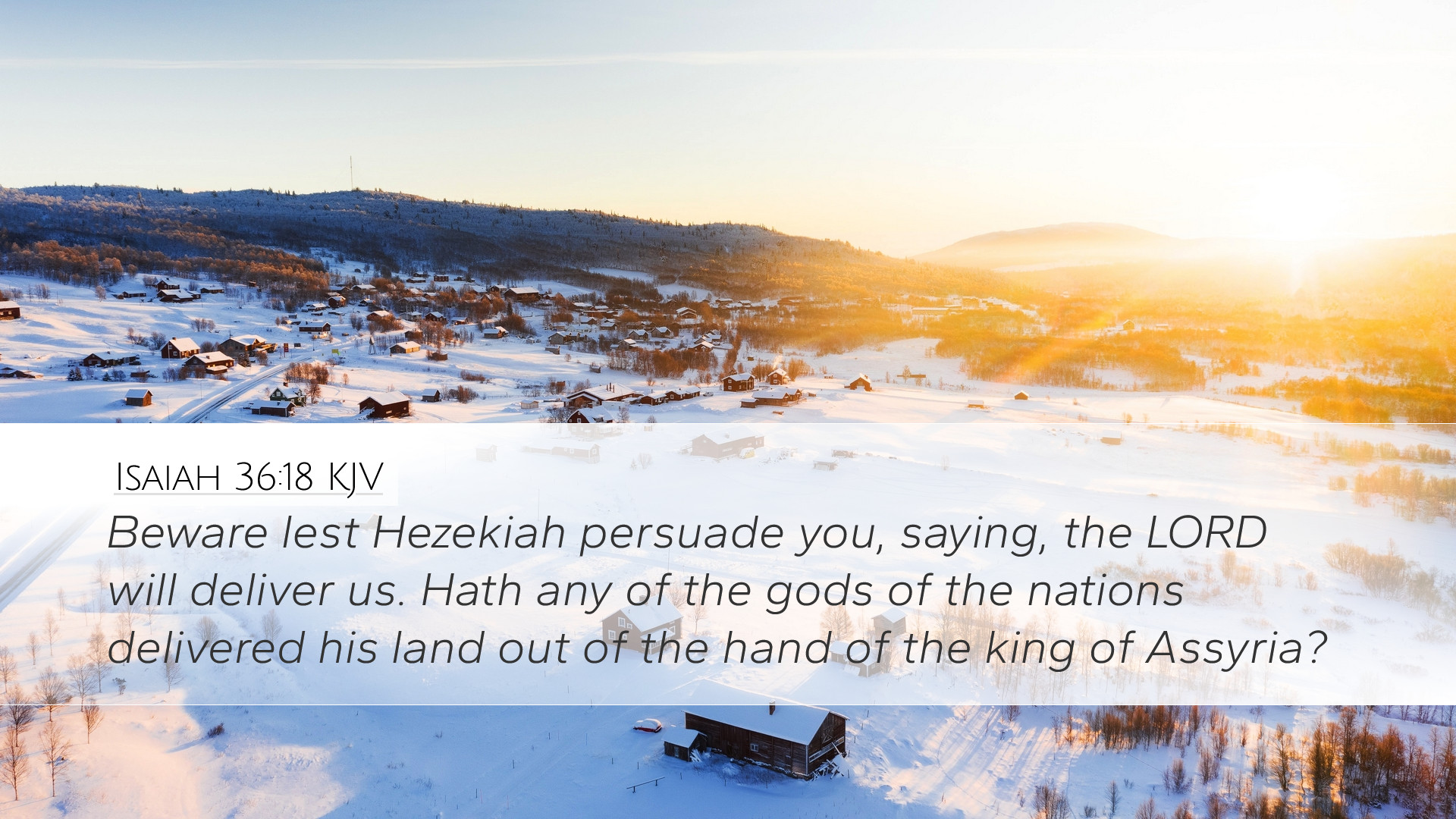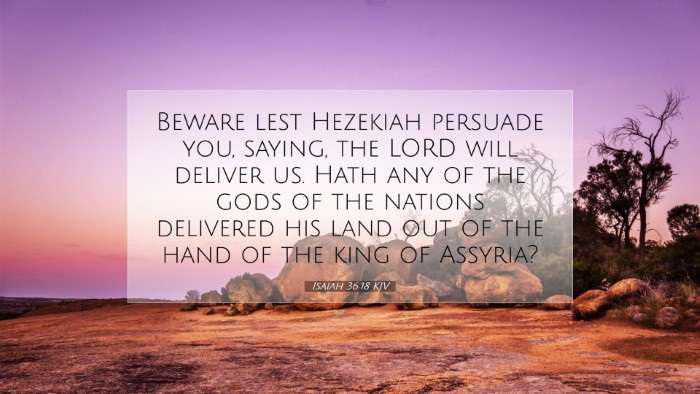Commentary on Isaiah 36:18
Text of Isaiah 36:18 (KJV): "Beware lest Hezekiah persuade you, saying, The LORD will deliver us. Hath any of the gods of the nations delivered his land out of the hand of the king of Assyria?"
Introduction
This verse emerges from a critical moment in the narrative of Judah’s struggle against the Assyrian empire. The communication comes from the Assyrian officials who challenge the trust of the people in their King Hezekiah and his reliance upon God. The verse reveals deeper theological implications regarding faith, divine protection, and the idolatry of nations.
Contextual Analysis
This chapter unfolds during the siege of Jerusalem when the Assyrian king, Sennacherib, sends his representatives to undermine Hezekiah’s leadership and faith in God. The challenge posed in verse 18 reflects the fierce realist perspective of the Assyrians, who have decimated other nations and cast doubt on Hezekiah’s reliance on Yahweh.
Historical Background
According to Matthew Henry, this period is marked by the Assyrian threat that looms over Judah, leading to fear and anxiety among the people. The humiliation of defeated nations and the rhetoric of the Assyrian officials were designed to create despair and confusion.
Rhetorical Strategy
Albert Barnes notes that the Assyrian commanders sought to intimidate God’s people. They appeal to the recent experiences of other nations, culminating in the implication that if their gods could not protect them, neither could Yahweh save Jerusalem. The Assyrians spoke not just to sway public opinion but to incite panic among the citizens of Jerusalem, attempting to portray Hezekiah’s faith as foolishness.
Theological Implications
This verse raises essential questions about faith in the face of adversity. The rhetorical questioning—"Hath any of the gods of the nations delivered his land out of the hand of the king of Assyria?"—implies skepticism toward divine intervention and underscores human despair in situations of crisis. Adam Clarke emphasizes that this verse reflects a plea not just against the inhabitants of Jerusalem but against their understanding of divine providence.
Deity versus Idols
The challenge set forth by the Assyrians forces a consideration of the nature of God versus that of false gods. The apparent "success" of the Assyrian gods in previous conquests poses a direct challenge to Yahweh's fidelity as a protector. Matthew Henry observes that God’s sovereignty is tested by such taunts, yet it is precisely in these moments that faith must confront the visible reality with its intrinsic belief in God’s deliverance.
The Role of Faith
Hezekiah's faith contrasts markedly with the cynicism of the Assyrians. The implication here is clear: genuine trust in God does not correlate with the majority opinion or apparent evidence. Instead, it is an act of boldness in the face of skepticism and overwhelming odds. Theology students and pastors are reminded that faith often exists in paradox—seen most clearly in the life of Hezekiah, who stands firm against the tide of doubt and fear.
Lessons for Modern Believers
For contemporary believers, the application of this verse remains poignant. It challenges congregations to examine their responses to external pressures that question their faith. Are threats from a secular world or societal skepticism causing them to falter? The truth revealed in Isaiah serves as a reminder of the essential nature of faith amid trials.
Resilience in Faith
Matthew Henry highlights that Hezekiah’s insistence on trusting in God, despite overwhelming fear from the Assyrian approach, is a model for Christians today. When faced with life’s difficulties—be it through oppression, societal mockery, or personal turmoil—the call is to remember God’s past deliverances and look confidently towards His promises.
Understanding Divine Sovereignty
The passage encourages deeper understanding and reflection on God's sovereignty over all nations and powers. Barnes remarks that believers must recognize that God’s might is fundamentally stronger than any human force or ideology that stands against them. This reassurance can guide Christians in their daily interactions and life choices, providing strength against the doubts sown by external disbelief.
Conclusion
Isaiah 36:18 is far more than a historical account; it blends narrative with critical theological reflections that resonate transcendentally throughout the ages. The passing of time does not dilute its messages about faith, divine reassurance, and the tension between God’s power and apparent impotence in the face of adversity. Scholars, students, and laypeople alike are urged to delve deeper into these truths, engaging with the rich theology embedded within this challenge to Hezekiah's faith. This ancient text remains a vital source of encouragement, a call to resilience, and a reminder of the omnipotence of the true God against all adversarial claims.


